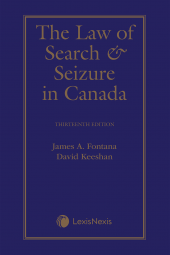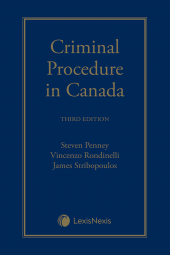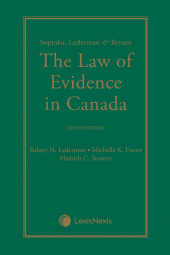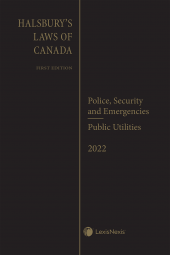The Law of Search and Seizure in Canada, 13th Edition
One Year Subscription Only Terms
Subscribers receive the product(s) listed on the Order Form and any Updates made available during the annual subscription period. Shipping and handling fees are not included in the annual price.
Subscribers are advised of the number of Updates that were made to the particular publication the prior year. The number of Updates may vary due to developments in the law and other publishing issues, but subscribers may use this as a rough estimate of future shipments. Subscribers may call Customer Support at 800-833-9844 for additional information.
Subscribers may cancel this subscription by: calling Customer Support at 800-833-9844; emailing customer.support@lexisnexis.com; or returning the invoice marked 'CANCEL'.
If subscribers cancel within 30 days after the product is ordered or received and return the product at their expense, then they will receive a full credit of the price for the annual subscription.
If subscribers cancel between 31 and 60 days after the invoice date and return the product at their expense, then they will receive a 5/6th credit of the price for the annual subscription. No credit will be given for cancellations more than 60 days after the invoice date. To receive any credit, subscriber must return all product(s) shipped during the year at their expense within the applicable cancellation period listed above.
Product description
The Law of Search and Seizure in Canada, 13th Edition is the definitive text on all aspects of this intricate and rapidly evolving area of criminal law. Much cited by Canadian courts at all levels, this seminal volume clearly lays out the complex legal framework that governs the issuance, execution and review of search warrants, and the rules limiting warrantless activities by state agents. The book also analyzes the central role of the Charter of Rights in determining the legality of police action and the admissibility of evidence when constitutional protections are breached.
Long relied on by judges, the criminal bar, law enforcement officials and academics across Canada, The Law of Search and Seizure in Canada, 13th Edition provides a comprehensive resource for understanding the often blurred line between legal and illegal government action.
What’s New In This Edition
This edition incorporates the judicial and statutory developments that have affected the complex field of search and seizure since publication of the 12th Edition, including:
- A significant modification by the Supreme Court of Canada to the law governing searches of premises incident to arrest where the area searched is outside the arrestee’s physical control at the time of arrest (R. v. Stairs)
- Application by the Supreme Court of the “plain view” doctrine to the often vexing issue of searches of electronic devices (R. v. McGregor)
- An important ruling on whether and how police may make a “fresh start” for the purposes of Charter compliance after Charter breaches have taken place (R. v. Beaver)
- Delineation of the parameters of search of the person incident to arrest, and what will constitute a mistake of law (R. v. Tim)
- Clarification of the circumstances in which an investigative detention will be found to have taken place, particularly where race and age are relevant (R. v. Lafrance)
- A definitive answer as to whether the police are entitled, under provincial highway traffic legislation, to issue a roadside screening demand when the accused driver is on private property
- A clear answer from the Supreme Court of Canada on the meaning of “forthwith” or “immediately” in the context of roadside alcohol screenings, and on whether a police officer not in possession of an approved screening device can make a lawful demand for a roadside sample (R. v. Breault)
- Recent amendments to the telewarrant framework to facilitate and normalize the use of warrant applications by telecommunication
Who Should Read This Book
- Criminal Law Lawyers whose clients rely on their expertise in this crucial area
- Crown Counsel whose case often stands or falls upon the admissibility of seized evidence
- Judges who need an understanding of the most current law and cases in order to rule appropriately
- Law Enforcement Agents on the front lines who simply have to know the limits of the law
- Academics in the field of criminal or privacy law who need a comprehensive analytical treatise
Table of contents
Part I: The Search and Seizure Process
Chapter 1: An Overview of Search and Seizure Law
Chapter 2: Search Warrants
Chapter 3: Requirements Common to Both Search Warrants and the Supporting Information
Chapter 4: Search Warrant Information
Chapter 5: Duties of the Issuing Judge or Justice
Chapter 6: The Execution of Search Warrants
Chapter 7: Disposition of Seized Goods
Chapter 8: Duties of the Peace Officer in the Search and Seizure Process
Chapter 9: Reviewing a Search and Seizure Process
Part II: Specific and Non-Standard Powers of Search and Seizure
Chapter 10: Special Criminal Code and Other Search Powers
Chapter 11: Technical and Electronic Surveillance
Chapter 12: Controlled Substances Legislation
Chapter 13: Seizure of Bodily Samples
Chapter 14: Disorderly Houses, Gaming and Betting
Chapter 15: Powers of Search Under Certain Federal Statutes
Chapter 16: Search Powers Under Provincial Statutes
Chapter 17: Computer-Related Searches
Part III: Warrantless Searches
Chapter 18: Warrantless Searches of Premises
Chapter 19: Warrantless Personal and Vehicle Searches
Part IV: Charter Issues and Exclusion of Evidence
Chapter 20: Search and Seizure under the Charter of Rights and Freedoms, Section 8 and Section 24
Chapter 21: Exclusion of Evidence
Chapter 22: Police Conduct in Section 24 Applications and Sub-Criteria
Chapter 23: Nature of the Evidence on a Section 24(2) Application and Various Sub-Criteria
Chapter 24: Effect of Other Charter or Statutory Breaches Combined with Section 8 Breach
Table of Cases
Index
 Lexis Nexis
Lexis Nexis 


